
by Kasia | Oct 2, 2017 | Writing
I love the start of a new book.
Coming up with an idea. Plotting the scenes. Discovering the characters. Uncovering a story with a life of its own.
It sounds almost cliché to say that the characters made me do it. They grew a mind of their own over the course of the book.
But it’s true.
Sometimes when you create a strong enough character, they take over the story in ways that you didn’t imagine.
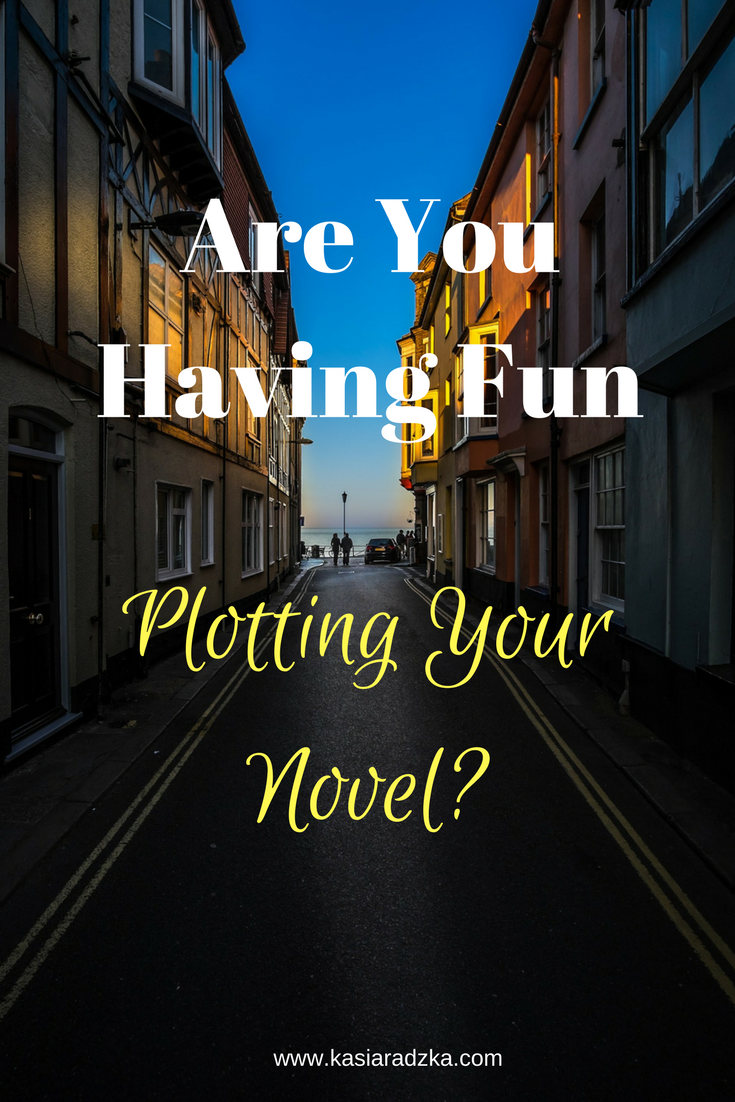
I had a character in my book that I initially was going to kill off. He was a bad guy after all, and in fiction, bad guys always get punished.
But he didn’t want to die and I didn’t want to kill him off, at least not yet.
So the story twisted in a way that explained his back story, he was still bad but he had redeeming qualities that were worthwhile keeping him in the series.
As crazy as it sounds, I’m looking forward to getting to know him better throughout the next few books in the series.
And only the other day, a reader and dear friend of mine, randomly commented about how she wants to know more about this particular character and can see his storyline involving. That tells me that I made the right decision in keeping him alive.
Whilst I like a book with good characters, I need the plot to engage me even more. But really, characters and plot will be intertwined.
When I start writing a new book I love the process of plotting.
During the plotting stage, you have the opportunity to create scenes, events, and situations for your characters to dig themselves out of. Plotting can also assist with character development.
What’s your characters primary goal?
Come up with ten obstacles that can get in their way.
For example, let’s say your character’s goal is to be left alone to lead a life of misery and self-loathing for stupid misdeeds of their past. What obstacles could get in their way?
– A squatter resides in the house for winter
– They come across a needy mother and baby in front of their building
– Witness an attack and they have to stop, therefore the person they saved wants to repay them and doesn’t leave them alone
– Someone is looking for them
– They get kidnapped by a lonely talkative villain
– And so on, and so on….
What’s your characters secondary goal?
Come up with another ten obstacles that could get in your characters way?
Elaborate on the obstacles.
Think about the different ways your character(s) would react.
In the example of where they come across a needy mother and her child. Initially they could ignore them (annoyance), then they leave some food or a blanket for them to make themselves feel better (guilt), they might be annoyed at first but then they don’t see the mother and child in a while (develop worry, concern), and realise that they don’t want to live alone and the human bond is important and they feel they must help them (redemption) and they fall in love (resolution). I think I just accidentally created the skeleton for a potential romance story.
Just the information alone poses several questions.
The main character.
Who is he? Why does he want to be alone? Why does he feel as if he needs redemption?
The mother and child.
Where did they come from? What/Who are they running from? Why did they end up there?
What if the situation was reversed where it was a father and son squatting in the building where a rich business woman lives and takes notice. What sort of conflicts and subplots could arise from that?
There are so many possibilities. The world is your oyster. You do with it what you please.
That’s what makes plotting so much fun!
Now, I would not say that there’s a book in that idea. There might be. But I do know there’s a kernel of an idea, an outline of a story that can be tweaked, further plotted and expanded to create a story that is novel worthy.
There’s still a lot of work ahead but that’s how simple plotting is.

When you come up with your story idea, add to it by brainstorming at least ten obstacles that could get in your characters way in achieving their goal. You won’t use them all, but the activity will get you thinking outside the box. Often the first two or three are the more obvious options, it’s only after about five that your creative well starts overflowing with more interesting ideas.
But please don’t get stuck with trying to come up with an original idea.
It’s near impossible.
Whatever ideas you come up with, they are going to have your slant on them. We all have different experiences in life. Even brother and sister living in the same family can have a completely different perception of what life was like in the home even though they shared the same environment.
It’s the same with writing, whilst it’s hard to come up with an idea that hasn’t been done to death already, you can use an old idea and make it new again by adding your personal touch to it.
When thinking about your plot consider not just the characters in it but also the setting, the emotions, the theme and the weather.
How would your plot change if your characters occupation, address, or age changed? A young college student will have completely different experiences, expectations, and realities than a forty-five-year-old male going through a divorce.
The little details about your characters lives can colour your plot in many ways.
That’s just one of the things that makes plotting so much fun – you can find out so much more about your characters.
In the end, your plot and characters will be intertwined intricately without you realising. At other times you are going to have work extra hard to get the plot and characters to complement each other.
Just remember to enjoy the process. Writing books is fun. Don’t stress too much over the details until you’ve written your first draft at the very least.
Go crazy with your plot ideas, let go of your inhibitions, and just write whatever comes to mind, no matter how crazy it seems. It’s your story, see what you can make of it.
How do you plot your novel? Do you have fun plotting? What challenges do you face when plotting?

by Kasia | Sep 22, 2017 | Writing
Happy Friday my dear readers and friends!

I love Fridays. It’s the first day of my long weekend every week. And while I’d love to say I’m always super productive, it doesn’t always happen that way.
Generally, the day is spent with my son. We go to the park or beach, most often than not we enjoy a coffee (him a babyccino) and sometimes we bake or arrange a playdate amongst the fifty other things I need to get done. I usually manage my run before the world wakes up, and sometimes I even let myself out for dinner and drinks once evening comes.
This morning it’s just before 6 am and the household is still sleeping as I write snuggled underneath the duvet, the birds are chirping outside, I can just barely hear the hum of the cars on the highway, and spring is in the air.
How do you like spending your Fridays?
FRIDAY LINK LOVE JUST FOR YOU
Want some new markets to approach? Here is a list of parenting and family markets that might need your knowledge and expertise – 27 Parenting and Family Magazines That Pay Writers. I know I’ll be checking them out and pitching during the weekend.
Need an excuse to binge watch some more Netflix this weekend? Joanna Penn writes about the benefits of watching television for writers – How Watching TV and Movies The Right Way Can Revolutionise Your Writing. I’m currently bingeing on Grimm and Outlander.
Ever considered being a Virtual Assistant? Work from anywhere anytime. Gina at Horkey Handbook gives you 10 Strategies to Find Your Dream Virtual Assistant Job.
Do you like to write creatively without making stuff up? Check out these 21 Magazines Currently Seeking Creative Non-Fiction.
Are you looking after your health and fitness as a writer? You can read my top 10 Tips To Help Writers Stay Fit & Healthy.
Well, that’s it from me today.
Hope you have a great Friday and a fantastic weekend!

by Kasia | Sep 4, 2017 | Writing
Are you a healthy writer? If you want longevity in your writing career you need to look after your health and fitness.
Healthy + writer. Not exactly what you picture, right?
I’m writing this whilst I stuff my face with a Jaffa biscuit. As long as the words keep flowing, I allow an occasional treat. Unfortunately, I’ve been giving myself too many treats of late and it’s doing zero favours for my well-being.
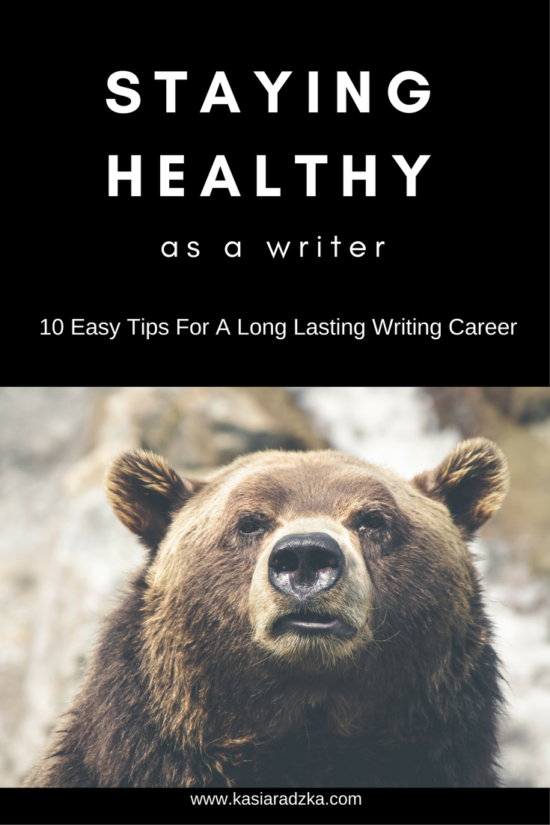
As a writer, I spend a lot of time sitting on my backside. The same goes for my day job.
So in a twenty-four hour period, I can easily spend between ten and twelve hours sitting on my butt. That’s not cool. Especially, when I start adding the chocolate, Jaffa biscuits, cheese and wine that I like to treat myself with each week.
Sooner or later, my body and mind are going to rebel. My work will suffer. The longevity of my writing will be threatened.
I want to be a healthy writer for the long term.
Don’t you?
If so, it’s important you start taking care of your health.
Studies suggest that sitting down for long periods of time is almost as bad as smoking. I can see the truth in that. After a few hours of sitting, I start feeling like crap.
Our bodies weren’t created for sitting for the majority of our lives. They were meant for moving. But add up the sitting of 8 hours a day, five days a week and you’re looking at 2080 hours a year or over 62,000 hours over 30 years or 7 years of your life on your ass and we haven’t even accounted for the time we spend in front of the idiot box, socialising over dinner or commuting.
Now doesn’t that paint a pretty picture?
A standing desk could be an option to counteract the effects of sitting, one attached to a treadmill would be even better.
But that’s not enough.
Doctors recommend approximately 30 minutes a day of physical activity. Thirty minutes is better than nothing but it’s not enough if you’re spending the majority of your day sitting down behind a computer screen.
You need to find a physical activity that you love doing and want to spend several hours each week taking part in it.
Throughout the year I like signing up for fun runs, marathons, and triathlons. These commitments help me remain accountable and ensure I get enough physical activity each week.
Combining running, swimming, cycling, weight training and yoga into my week means that I’m less likely to get bored and more likely to keep training and stay fit – they also help counteract all the chocolate I eat and wine I drink (at least that’s what I tell myself!)
Yes, there are weeks where I just say, ‘screw it’, and manage one run.
Then there are the weeks where I can comfortably fit in ten hours of training.
I like those weeks best.
During those weeks I write more too. I sleep better. And I’m much nicer to be around.
That’s just one more reason to get physical.
What are some health issues writers are at risk of?
Writers – no thanks to the type of work they do – spending their days mostly sitting, staring at a computer and typing away on a keyboard, this means that writers have a higher risk of certain health ailments, including but not limited to;
* Carpal tunnel syndrome
* Obesity
* Blocked arteries
* Hemorrhoids
* Bad back
* Neck pain
* Vision problems
The severity and seriousness of these vary but regardless, you want to avoid all of them as much as possible.
The good news is that most of them can be prevented to some degree especially when you take responsibility and initiative from the get go.

10 TIPS TO HELP WRITERS STAY FIT & HEALTHY
1. Take 30 minutes each morning to go for a walk before your writing session.
Use it as an opportunity to think about what you want to write. It’s an active brainstorming session that will get your heart pumping and your upcoming writing session much more productive.
2. Take up a team sport for motivation and accountability.
It might have nothing to do with writing but it will give you accountability to get moving a few times a week and prevent you from becoming a hermit. New friends, new opportunities, new ideas for your writing.
3. Sign up for a 5km or a marathon and learn to run.
I love running. Not everyone does. But once you actually get started running is a great option for writers because it can be done anytime and anywhere. It’s also free and accessible to almost everyone.
4. Try yoga – even ten minutes a day can make a difference.
You spend your time writing in an unnatural position, often hunched over a keyboard, taxing your entire body. A bit of yoga every day can lengthen and strengthen your limbs and alleviate any niggles that might be bothering you. Start with ten minutes a day and you’ll feel the difference within a few short weeks.
5. Hire a personal trainer and commit to one or two weight sessions each week.
Yes, even once a week with a good trainer will make a difference to your physical well being. Weight training is a great way for a writer to get full body strength as well as work on core work that will support the hours you spend sitting at your desk.
6. Even spending five minutes every hour doing a quick circuit workout will get your blood pumping, burn calories, and make your skin glow.
If you lack the time or money, or simply don’t like the idea of a gym, take five minutes every hour to get on the floor and do a quick circuit workout. This is my favourite mini workout:
10 push ups
20 squats
10 dips
15 burpees
20 crunches
30-second plank
Repeat 2-3 times
7. Improve your eating habits by ensuring you get enough of the red, green, blue and yellow.
Always aim to colour your plate. It helps if you love vegetables. Brussel sprouts are one of my favourites. There’s only one vegetable I won’t eat and that’s celery. One of my favourite ‘healthy snacks’ is chopping up carrot and cucumber sticks and dipping them into jalapeno flavoured hummus. Yummy!
8. Add fruit to your breakfast.
There’s a lot of controversy around fruit and its sugar content. At the end of the day if you’re going to eat sugar it’s better off coming from a piece of fruit than a Mars Bar or a can of Cola. Strawberries, blueberries, and raspberries are great low sugar options. Enjoy an apple a day. Bananas are rich in B vitamins and potassium. I used to eat oats with sliced up fruit for breakfast during the work week but now I’ve shifted to just eating fruit. My breakfast of choice during the work week at the moment is a punnet of strawberries, apple, and banana plus a cup of coffee with a pinch of milk.
9. Include a cup of vegetables with your lunch and dinner.
The recommended daily dose of vegetables is 5 serves. Chances are you’re barely getting one. Opt for a salad for lunch and steamed vegetables or a vegetarian stir fry for dinner. It doesn’t have to be dull. Add your favourite cut of meat, a piece of fish or some tofu, dress it up with half a cup of quinoa or black rice or a handful of slivered almonds or some sesame seeds.
10. Follow your characters physical footsteps
Is your character into martial arts? Why not sign up for a few krav maga lessons. You’ll not only learn a thing or two but also add authenticity to your writing when describing any fighting scenes.
Other fun physical activities could include archery, rock climbing, pole dancing, hiking, shooting, tai chi, horse riding or CrossFit. Don’t limit yourself. If you have the opportunity give it all a go. You might be surprised at what you enjoy doing.
It might be easier to grab a packet of crisps and a chocolate bar in the short term, but long term wise you’re going to be better off taking the time to fix yourself up a healthy meal, cutting up some veggies or walking the extra mile.
Staying healthy as a writer doesn’t have to be difficult. It’s the little things that you do every day that will make a difference to your health and well-being. Forget the quick fixes and crazy diets. Start with a small change and build on it each week. Before you know it you’ll have developed healthy habits for life and build a long lasting writing career.
Are you a healthy writer? Do you fill up on fruit and vegetables? What are some of your favourite ways to stay active? Does it help or hinder your writing?
*Remember to always consult your health professional before commencing a new diet or exercise program. This article is for informational and entertainment purposes only and should not be constituted as personal advice.
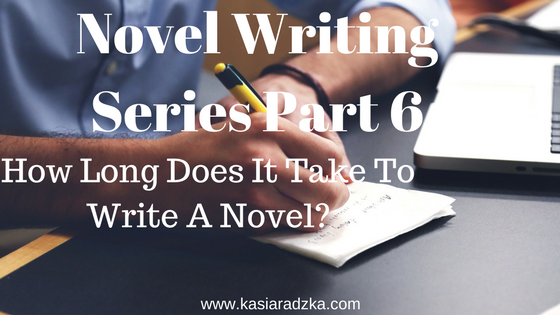
by Kasia | Aug 13, 2017 | Writing
Q: How long does it take to write a novel?
A: However long it takes you.
A year. Six months. Twelve weeks. Ten days. Twenty-four hours.
It’s the same as asking how long is a piece of string. It all depends on where you cut it, right?
Writing a novel is a time-consuming exercise.
No matter what anyone tells you, you’re not going to have a novel ready for publication overnight. It just isn’t going to happen.
Sure it’s possible, 24 hours in a day and a writing pace of 2500 words per hour. You could get a draft.
But it’s not realistic nor probable.
There are prolific writers who churn out a book every 45 days (think Nora Roberts aka JD Robb).
Then there are those who might put one book every year or two (Patricia Cornwell, Lee Child).
There are indie authors who write several books a year (Mark Dawson, Bella Andre, Russell Blake).
And then there’s you.
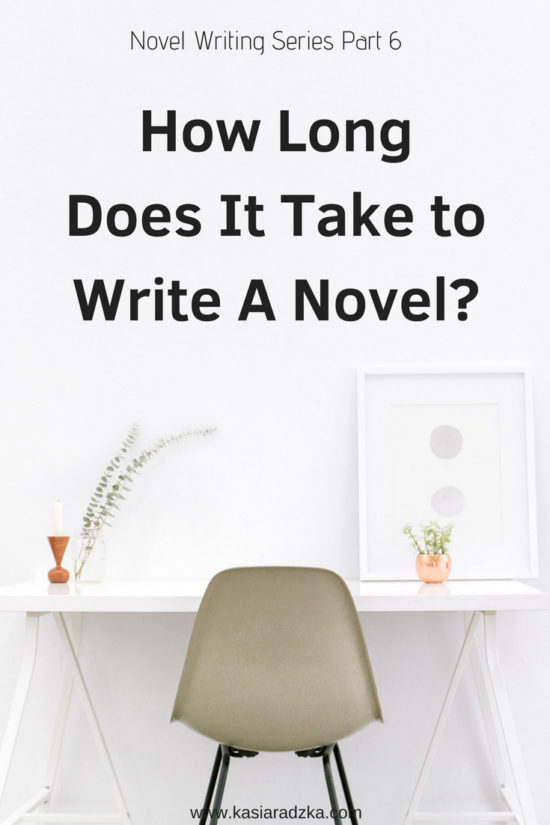
How fast you write a novel comes down to how fast you write your novel.
There are a number of factors that you need to consider. Ask yourself the following questions and they will lead you to your answer.
How much time do you have to write each day?
How fast do you type?
Are you organised with your story?
Have you planned out your scenes?
If you’re aiming for an 80,000-word novel, you write 5 days per week, one hour a day, and 1500 words per hour, and you know your story and scenes, then you could have a novel written in about 10.6 weeks. So, just under 3 months.
I can average about 50 words per minute without too much strain. If I were to write at that pace continuously for one hour, I’d have 3000 words down on the page.
Unfortunately, that sort of pace and output is not realistic every day.
Sometimes one hour of writing can give me that 3000 words, whilst at other times it hovers around 500 words.
I write as fast as I can on my commute to work, and if I’m consistent then I can have a draft finished between 30-45 days.
A draft.
That’s not a finished novel.
After the draft is done you have to consider the different types of editing.
I think that the more books you write, the less editing you end up needing because you start mastering some skills, techniques, and tactics, making the writing process of a novel much smoother.
At the beginning your book might require the following:
- A structural edit
- A copy edit
- A line edit
- Proofreader
- Beta readers
By the time you finish writing your fifth book, you might only need the following:
- A copy edit
- Proofreader
- Beta readers
If you’re really super talented and awesome at self-editing you might get away with just a proofreader and some beta readers.
The fact is, writing a novel is hard work and it’s time-consuming. Just because there are thousands of books being released on Amazon on a weekly basis doesn’t mean that they were easy to write or have given all the editing options a chance.
Writing a novel is more than just about writing a novel. That’s just the beginning.
So even if you’re a speed demon when it comes to typing, it’ll take you four weeks to draft a novel.
- Allow another two weeks for self-editing.
- Another two weeks for an external edit if you’ve got your editor booked in.
- Another week to proofread the book.
- Potentially another two weeks or so to get beta readers feedback.
- A further week to make corrections and proofread.
Three months.
Do it every quarter and you can have four books out in a year.
Easy, right?
Maybe.
It all comes down to the type of quality product you want to produce and how much time you have to commit to writing the novel.
Let’s be honest, someone who has no kids, no job, and zero commitments, has much more time to commit to writing a novel than a single full-time-working mum with four kids under six.
I don’t think it matters how fast your write your novel. What matters is that you get it written.
One thing I have noticed in my own writing process is that I get much more written when I have less time. The difference is, is that I know that I have a limited amount of time and it’s the only time in the day that I can be done.
That means, my brain has been trained that come 6:05 am when I sit on the train, the muse is waiting for me to start putting words to the page.
Day in, day out like clockwork. The words get written.
- Lethal Disposal was written over several years.
- I finished writing Lethal Games in about six months with lots of breaks in between.
- Lethal Instincts took about six weeks to write.
- I drafted an upcoming standalone suspense-thriller in 30 days during NaNoWriMo back in 2008, stewed on the idea for several years, then rewrote it over the course of another 31 days in July.
As you can see, each book took a different amount of time to write. It all depended on the time I had carved out for my writing.
Did you read that last point?
I said, how much time I had carved out for my writing, rather than how much time I had available.
We all have a finite amount of time available to us. It’s how we choose to use it that reflects on what we are able to achieve during this time.
How important is writing a book to you?
If it’s a priority you will make the time for it regardless of your schedule.
As a working mum with a boisterous and cheeky three-year-old, and a dozen responsibilities, I know that if I don’t write on the commute to work, chances are I’m not going to write at all.
Maybe you’re not that lucky to spend an hour or so on the train morning and afternoon to write. That’s fine. Not everyone does.
How about spending 15 minutes writing whilst your kid naps?
What about using half of your lunch break to work on your book?
Maybe you’re an early bird and can wake up an hour earlier?
Night owl? Write when everyone is asleep and go to bed later.
Instead of partying every Friday night, spend a couple of hours working on the novel.
Jot down notes, dialogue, setting as you wait at the doctors, accountants, lawyers, office. Whatever.
It can be done.
You just need to to take responsibility for your time and prioritise.
If you want to write a book, you will, regardless of the amount of time it’s going to take you.
As Nike puts it, Just Do It.
How long does it usually take you to write a novel from start to finished product? Do you procrastinate? Any tips for faster writing?
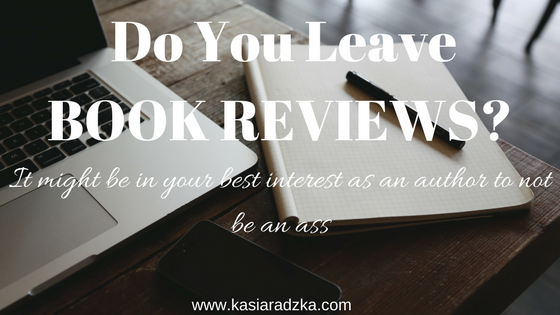
by Kasia | Aug 11, 2017 | Writing
Check out the reviews on Amazon, Goodreads, Kobo and you’ll see a pattern developing. A book with a significant amount of reviews will the majority of the time be faced with 1-star reviews that might comment:
“There was no full stop at the end of the sentence on page 245.”
“The book was predictable because the man and woman lived happily ever after.”
“The fantasy wasn’t realistic.”
“I couldn’t get past page 3.’
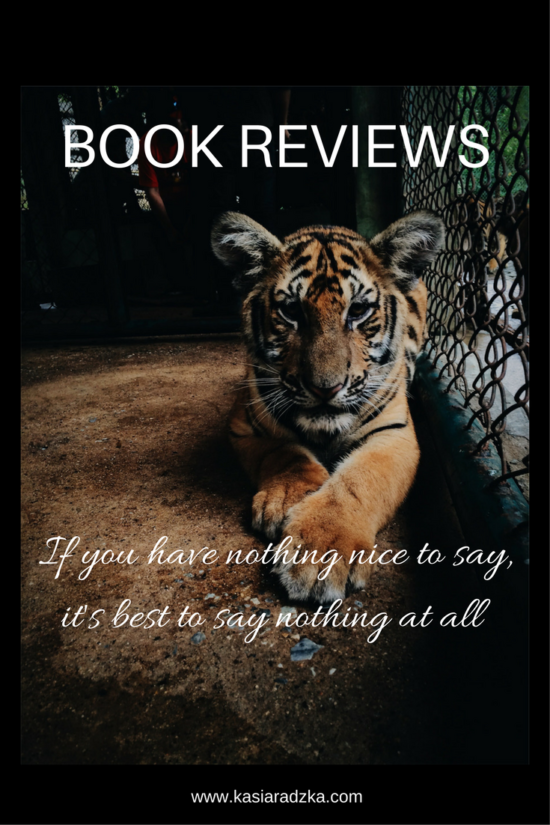
Here are some real dumb ass and hurtful comments I found on Goodreads for well-known authors.
1. “I could not read this. The prose is terrible. Commas are rare. Periods are abundant. I got through one chapter…” Killing Floor (Jack Reacher, #1) by Lee Child
The fact that the reader only got through one chapter he should not be reviewing the book. The fact that he paid $1 a piece might mean that he bought a pirated copy. Besides you’re not reading a book like Killing Floor for literary mastery – it’s entertainment, pure and simple. It was a long book but I enjoyed it.
2. “If I could give this no stars, I would. This is possibly one of my least favourite books in the world, one that I would happily take off the shelves and stow in dark corners where no one would ever have to read it again…” To Kill A Mockingbird by Harper Lee.
The last I heard, To Kill A Mockingbird, is a classic. It’s on my ‘to read’ shelf.
3. “Garbage. Absolutely horrifying, utter trash. A waste of trees, bookshelf space and precious, oh so very fucking precious brain cells…” Fifty Shades of Grey by EL James.
Whoever thought porn for women was ever going to mainstream? Yet EL James sold millions of books, has had the books made into movies, and is rewriting the books from the perspective of the male character. Reviews are subjective. Soz, but unless you’ve made squillions from your writing – keep the nasty to yourself. And even then, didn’t your parents ever teach you to not say anything unless you had something nice to say?
4. “This book is such a steaming pile of shit for so many reasons and hands down the worst book I have ever read….” Gone Girl by Gillian Flynn
And yet it became a motion picture and sold millions of copies.
5. “Recommends it for: no one…” The Secret History by Donna Tartt
This book won literary awards. Not every book is going to be everyone’s cup of tea.
As you can see, not even famous and prolific authors are immune to nasty reviews.
Reviews are a blessing and a curse. If you put your work out there you’re going to get reviewed at some point.
Personally, I won’t leave a review if I think a book is less than 3 stars. I’m happy to say that most of the books I have given a go have been above that.
Why do I only leave a review if I think a book is better than 3 stars?
- I’m an author and I know how sensitive creatives can be. There’s no need for me to publicly shame or hurt someone’s feelings. If I were to see way too many errors in a book then I’d politely email the author to give them a heads up, it would be their prerogative to leave the book as is or fix it. Once upon a time, someone did this for me and I was very grateful.
- There are enough trolls out there that take pleasure in trying to make others feel like shit. If their existence is so dull that they want to take it out on the world, well then, that’s their prerogative and the unfortunate side effect of anonymity on the internet.
- I might not have been the target audience for a book. I can’t comment on the quality of a fantasy or science fiction book because I don’t read too many of them. I love crime, thrillers, non-fiction and some chick lit though so I’m more likely to leave a review on those.
- I simply thought the book sucked. And you know what, I have a right to think that but that doesn’t mean that I have to share it publicly. If anyone asks my opinion I can give them an honest review but the things you write on the internet are going to stay there forever. I don’t want to create any bitter feuds with fellow authors or readers. Just because I don’t like the book, doesn’t make it a bad book.
- Writing is tough and wonderful at the same time. I know how hard and time-consuming it is to write a book. If you’ve made the sacrifices in your hectic schedule to pen a novel, be it genre fiction, literary or nonfiction, I salute you. If I can, I want to pull you up not push you down.
I hope that when someone reviews the books that they read that they too consider these points. Leaving nasty reviews is not conducive to any art form.
However, that doesn’t mean you can’t leave a one or two-star review. You can, just make sure that your comments lean towards the constructive rather than the malicious.
The same goes for beta readers. It’s possible to be critical without being nasty. Check out this piece I found on being a better beta reader –> How to be a better beta reader, and stop being an asshole
I’ve had people tell me that my books are good, great and not so good, just by the expression on their faces. They have a right to think any of those things.
As an author and a reasonable woman (one hopes!), I decide how I’m going to feel about their reviews and what the consequences will be. I also know that not everyone is going to love my books – even my mum is happy to tell me what she doesn’t like in my books! And that’s ok.
Because I have one major goal when I write a book:
To make each book better than its predecessor.
I hope that fellow authors have a similar goal.
This is the only thing we have control over, so we might as well work on improving our efforts to reduce the risk of bad reviews. The key word is to ‘reduce’ not eliminate. Thanks to trolls, we’ll never eliminate negative reviews.
I feel the same way when I run or do a triathlon. With each race I want to improve my performance whether that would be to finish in a better time, run a negative split (second half faster than the first), feel better when I finish, improve my technique. These are all little things that make a difference.
Writers need to be aware of similar improvements in their writing. It’s not just about how much money they’ll make or reviews they’ll get.
-
It’s improving their vocabulary and using the language in a more clever way.
-
It’s adding vibrancy to the setting with each story they write.
-
It’s about creating more realistic dialogue and making the characters in each book sound unique.
Sometimes the little things can make a huge difference.
By focusing on improving vocabulary, technique, setting, description, characters, and plot, authors will improve automatically on the entire package. The result will be a better book each time.
Yes, it’s important to write an entertaining book with no loose ends. Both grammar and spelling are important too. Your book needs editing regardless of what your mother, best friend, husband, next-door-neighbour thinks.
Regardless of how good your book is, even if it reaches the New York Times Bestseller list, you will be faced with negative reviews – sometimes for no reason at all.
-
If you can’t deal with it, don’t put your work out there.
-
Got a bad review? Don’t defend yourself because you will only make it worse.
-
If you leave a review, make it a positive one.
As you continue improving your stories you will slowly start growing a fan base. It might happen from book one, it might from book five.
Write for the right reasons and make sure you enjoy the process. It’s the only thing that you control. You can’t make readers love your books. So aim to write the best book you possibly can, then rinse and repeat.
Don’t worry about what others are doing. Write your own book, support your fellow authors, and hope that they will return the favour.
One thing I’ve noticed though is that you’re more likely to get bad reviews from trolls who are either too scared to publish their works, have received unfavourable reviews of their own, or want to crush your spirit to make themselves feel better.
You have zero control over that. The only control you have is not becoming one of them.
Regardless, bad reviews are part of a writers’ life.
Deal with it. Then move on.
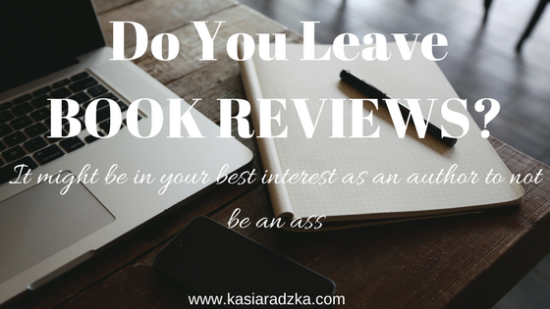
6 Quick Tips For Leaving Book Reviews
1. Think before you hit publish. How would you really feel if you were the recipient of the review you’re about to post?
2. Is your review helpful to the author or reader? If it’s not, don’t post it.
3. Are you a fan of the genre? If you don’t normally read the genre you probably shouldn’t be posting a review.
4. Yes, you’re entitled to your opinion but doesn’t mean that the world is entitled to yours – especially if you’re trying to be hurtful. Think how you would feel if someone gave that review to your child for example?
5. Don’t lie just to make someone feel better. I hope that when friends read my books and leave a review that they are being honest. I’m not going to get upset if they don’t leave a review because they didn’t like it or give me three stars instead of five. I’ll value their honesty much more if they don’t bullshit me.
6. Have you actually read the book? You shouldn’t be leaving reviews if you’ve only read half the book.
–> Are You Naughty Or Nice When Writing Book Reviews? <–
Reviews are a necessary evil for a writer. Sometimes they will lift your spirits, other times they will sting like a knife to the heart.
The only thing you can do is treat other writers with the respect that you want to be treated with. Nothing less, nothing more.
And go write the best book you can!
Remember, as a writer you have the power to share and transform the world with your words. Make sure that your legacy as a writer, is a positive one.
Happy Writing & Reading!
What are your thoughts on book reviews?
Have you ever received a scathing review or given one in return?









